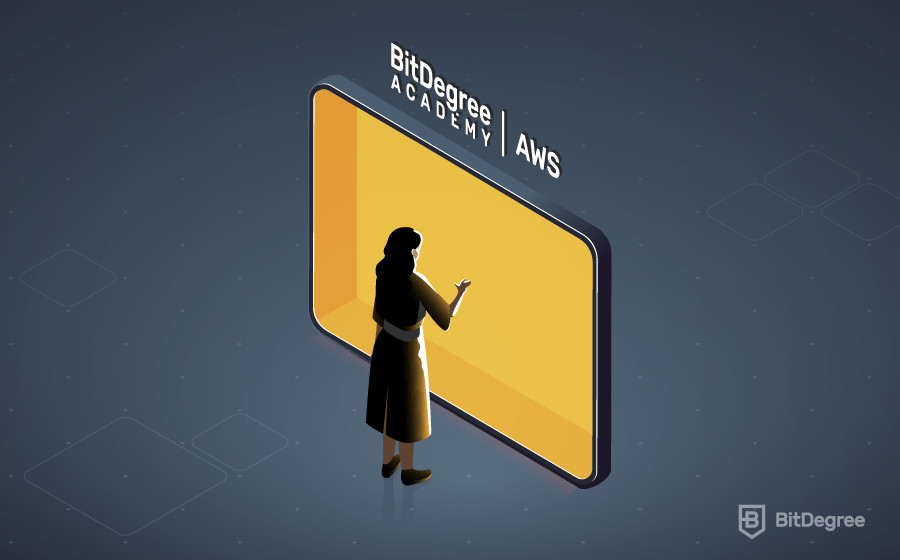Stepping In: AWS Entry-Level Jobs
If you got interested in cloud computing and AWS jobs fairly recently, you probably have little to no work experience in the field. Not the best position to be in, right? Most job listings want you to have at least a bit of professional experience, and there’s no way to collect any without getting hired in the first place.
AWS entry-level jobs are usually the ones with the least responsibilities: you certainly won’t be hired to create the entire cloud infrastructure for some massive corporation from scratch. However, you can certainly become:
- An AWS consultant who helps businesses select the best AWS products, services, and solutions for their needs, keep to their budgets and implement best practices
- A cloud administrator who sets up the cloud system and keeps an eye on them (no duties relating to stuff like hardware or networks)
- A cloud systems analyst who researches the needs and goals of an organization, evaluates the systems and strategies it’s using and provides recommendations on improving the efficiency and security of the processes
Want to aim a little higher? Here’s a handy list – reaching your goal and starting an AWS career will be a lot easier if you can check one or more items on it:
- You have at least one valid AWS certification (obviously)
- You have already completed some projects using AWS
- You’re familiar with coding and know at least one programming language
- You have an IT background (not necessarily cloud-related)
- You know the basics of the DevOps culture and CI/CD practices
- You are skilled in Linux administration
Not yet having a ton of cloud computing experience doesn’t mean there are no AWS jobs you could qualify for: it’s the whole package that matters!
AWS Developer Jobs and Salaries
Once you get past the Foundation level, AWS certifications are all position-focused: the topics and subjects they cover have to deal with the knowledge you’d need for a precise role in a company or organization. For example, AWS Developer – Associate is a great choice for those striving for AWS jobs in sectors of IT and development.
According to ZipRecruiter, a US-based AWS developer earns $122,799 a year on average. Not bad, huh? In addition to that, these specialists are needed in thousands of companies all around the world. Aside from being experts in the fundamentals of the AWS platform, AWS developers must also be capable of building, managing, and scaling the cloud infrastructure of web-based apps. This requires a solid understanding of AWS services and products, including SDKs, as well as security and scalability. Common responsibilities in AWS developer jobs may include:
- Implementing monitoring and service capacity planning techniques
- Writing and migrating infrastructure while preventing downtime
- Defining best practices and preparing their detailed documentation
To improve their chances at getting one of those highly-coveted AWS jobs, developers should make sure they are fluent in one (preferably more) programming language. Candidates should also be proficient in using CI/CD pipelines, AWS service APIs, and AWS CLI.
AWS Solutions Architect Jobs Explained
For someone who has little to no experience with AWS jobs and cloud computing overall, the role of a solutions architect might seem unclear at first. Despite that, it is currently the best-paid AWS certification and one of the best-paid IT credentials overall in North America. Additionally, the AWS Solutions Architect certification is the only one in the entire AWS certification program that can be obtained in two different tiers – Associate and Professional.
What makes it so special? AWS Solutions Architect jobs require expertise in planning, building, and deploying AWS-based applications that are not only efficient but also secure and highly robust. There are 5 so-called pillars of the AWS Well-Architected Framework – a solutions architect must know and follow them by heart:
- Operational Excellence Pillar – running, monitoring, and improving the systems to constantly boost added value
- Security Pillar – making sure that all the data and systems are protected
- Reliability Pillar – providing consistency and quick recovery
- Performance Efficiency Pillar – making the most of the available resources
- Cost Optimization Pillar – preventing unnecessary expenses
A solutions architect is a responsible role that requires not just technical knowledge but also perfect interpersonal skills: in AWS jobs like this, it’s crucial to be able to quickly and precisely identify your customer’s requirements and match them at every state of the project. More often than not, solutions architects need to collaborate with teams of business development, product, and engineering, as well as specialists like account managers.
One More Thing AWS Jobs Can Mean
Chances are, you are not a highly-skilled cloud specialist but a passionate user and champion who believes AWS is the best thing to ever happen in the technology sector. In such a case, you might have thought about starting a different AWS career – one that is related to working not with AWS but rather at AWS.
Being a global market leader takes a ton of expertise and effort, and while this means AWS has huge technical teams, it also employs hundreds of professionals in departments like marketing, design, sales, and others. The listings for all the departments and locations can be found on the AWS Jobs page, and it’s easy to filter by department, city, and job type. Most people who’ve held AWS careers say it’s challenging but also incredibly rewarding – and the possibilities for growth are off the charts.
In addition to that, if you manage to get one of the AWS jobs in technical departments, you’ll have a front-row seat to leading cloud computing innovations, participate in the most breathtaking projects, and be able to leave your mark in the world’s most prominent cloud platform. There aren’t many careers that can offer this much action and excitement!
So – Which AWS Career Will You Choose?
As you can see, the range of opportunities for AWS enthusiasts and champions is massive. Furthermore, it’s not limited by location: cloud specialists are needed in virtually every corner of the world, and whichever position you choose, you are guaranteed to work with the most innovative and constantly upgraded cloud services and products in the world.
If you’re interested in AWS jobs but haven’t got enough expertise for them just yet, don’t worry: everybody was a beginner at some point of their AWS career. Start by mastering the basics – e.g., this AWS Cloud Practitioner certification training course is a perfect option for someone who wishes to start strong!











